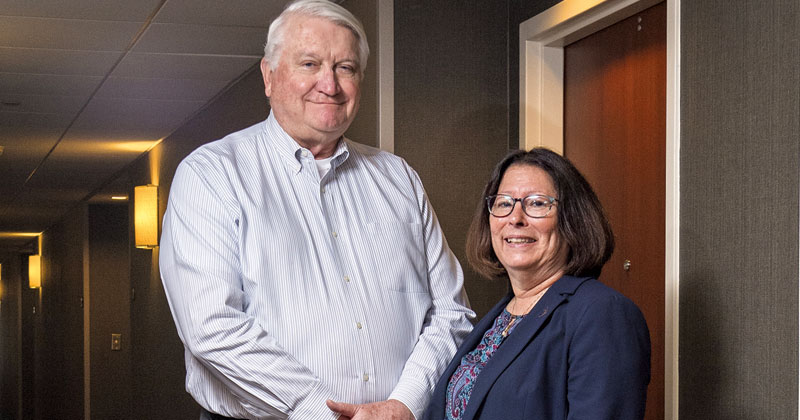


Hospitality is... busting crime
UD experts are combatting sex trafficking in Delaware and beyond
April 20, 2023
Glitz, glamor and an intergalactic neon sign visible from three miles away. This was the Stardust Resort and Casino, once the largest hotel in the world. It embodied all the razzmatazz of its Las Vegas home, but beneath a glittery facade, something dark and insidious took place.
“You knew something was off when certain people checked in, but you couldn’t pinpoint it,” says Sheryl Kline, who worked as a Stardust manager in the 1980s. “They just didn’t look like couples.”
Today, Kline knows exactly what tripped the alarm bells in her head: sex trafficking, a particularly vile brand of human trafficking in which people, mostly women and girls, are forced into sexual slavery. (Kline never encountered any child victims during her time on the Las Vegas Strip, or her “gut would have kicked in.”)
Now, she’s working to make sure the crime never goes unchallenged again.
Her mission began in the early aughts. As a hospitality professor at UD, Kline channeled her six-year hotel management stint in Vegas into academic work. She researched human trafficking in the state (and particularly the hotels) of Delaware, a potential hotbed for the felony given easy access to the I-95 corridor. Underreporting makes meaningful statistics hard to come by, but, in 2020, the National Human Trafficking Hotline received 127 tip reports from Delaware. The major takeaway: The crime doesn’t just happen within seedy roadside motels or the hyper-sexualized boundaries of Sin City.
“It can be anywhere,” says Kline, now the deputy dean of Alfred Lerner College of Business and Economics. “People are shocked to learn this occurs in their own backyard.”
Kline’s research informed the first law in Delaware specifically targeting human traffickers, passed in 2014. And it became the launchpad for developing, along with UD Prof. Bill Sullivan and the Delaware Hotel and Lodging Association, a training program that helps hospitality workers identify and respond to trafficking in the hotel workplace. Today, this program is woven into the Blue Hen curriculum, and it’s been administered to hundreds of hospitality professionals across the state and nation.
“People in our training sessions have revealed they themselves were once victims,” Kline says. “That becomes an incredibly moving, emotional experience. They are grateful for the training, because even survivors aren’t necessarily aware of how to handle such a situation.”
Some of the red flags? Paying with cash, requesting a room in an isolated part of the building, refusing to provide identification. Perpetrators may also make frequent requests for extra sheets and towels, and—noticeable to houskeepers—leave credit card readers and evidence of pornography in a room.
“Because many victims don’t recognize themselves as victims, you can’t just walk up and ask if they’re being trafficked,” Sullivan says. “Doing so could make the situation worse.” Instead, workers who suspect foul play are instructed to inform a manager and call the police.
Expanding the scope of hospitality to include such life-saving detective work makes natural sense to the UD team.
“Service is ingrained in every one of us,” Kline says. “We aim to make lives better.”
Contact Us
Have a UDaily story idea?
Contact us at ocm@udel.edu
Members of the press
Contact us at 302-831-NEWS or visit the Media Relations website


